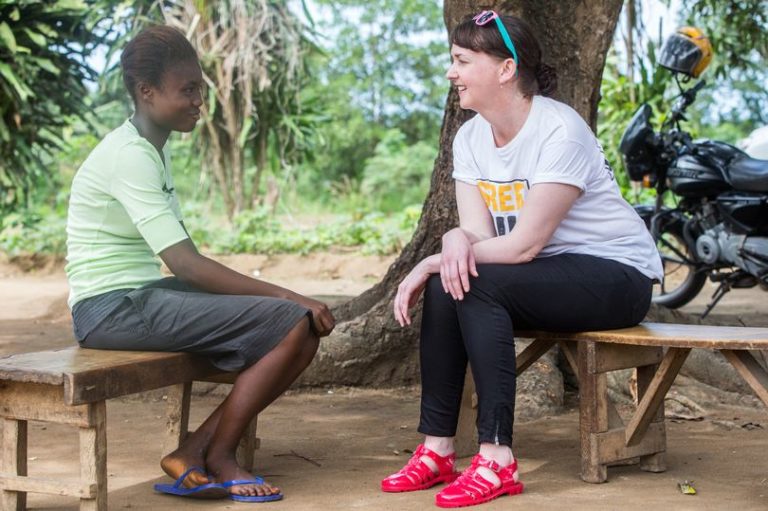Health
British Nurse Who Survived After Contacting Ebola Returns To See The Patient She Was Trying To Save
British nurse Pauline Cafferkey who survived the Ebola virus after contracting it while on duty in Sierra Leone in 2014 has returned to the country to see M’balu, an Eboola patient she was trying to save when she was affected.
Cafferkey returned to Britain in December 2014, after six weeks volunteering with Ebola patients in Sierra Leone, West Africa, only to find she too had caught the disease.
Dubbed the Ebola angel for her selfless efforts during the epidemic – which also spread into neighbouring Liberia and Guinea, killing 11,000 in total – Pauline was diagnosed with the contagious disease days after returning home.
Then in 2014, apart from her eyes, M’balu could not see the woman under the protective suit, who gently bathed her burning skin and changed her soiled sheets as she lay close to death in an Ebola clinic.
She couldn’t hear her voice, either, but the terrified 15-year-old could see her name, scribbled across the top of her visor – Pauline.
“The name made her human and I felt safe,”
M’balu explains.
Weeks later, that name made headlines across the globe.
Knowing only too well what could lie in store, Cafferkey propped her will on her dressing table and was quickly flown by the RAF in an isolation tent to the Royal Free Hospital in North London.
She endured three weeks of hell but survived, only to be struck down a second time nine months later, when the virus also triggered meningitis .
Ever since, she has fought crippling side effects , including initially being unable to walk. Now, she has returned to Sierra Leone for the first time, in a bid to find “closure”.
In an emotional meeting, she was reunited with M’balu, who, with Pauline’s help, beat the virus
“I have never doubted what I did coming here, but meeting M’balu is the ultimate confirmation it was worthwhile,”
she says, holding the girl’s hand.
The excited teenager’s cuddles – in a country where, in 2014, there was an no-touching policy – moves the nurse to tears. “What I have been through has taken an emotional toll,” she says.
“I have tried counselling, but it didn’t work for me. But coming back here has been therapeutic. It’s about being able to visit communities, meet survivors, see what they are achieving now.
“It has eased the pain of the past two years a little bit.”
The unassuming Scot, 42, says she doesn’t like to get teary, but admits: �
It has been good to have a good cry
“It’s not self-pity, but I can empathise a lot more with people here because I have been through it myself.
“I cried when I met M’balu because I felt for her, reliving what she had suffered. For a while I thought about what I had been through every hour of every day. It was all-consuming.”
In the throes of the disease, Pauline, M’balu and many other victims, suffered severe fever, diarrhoea and vomiting. Ebola can also cause the body to swell and the organs to fail.
Pauline describes the feeling of battling the illness as
“nothingness”.
She cared for hundreds of patients in the Kerry Town treatment centre, close to the capital Freetown, who experienced the same suffering.
M’balu has always remembered her, and has been desperate to thank her
“Ebola angel”
– a nickname modest Pauline feels embarrassed about
Follow us on social media:-

 Celebrity Gossip & Gist1 day ago
Celebrity Gossip & Gist1 day agoMoment stage collapses on Odumodublvck during concert performance (Video)
-

 Economy1 day ago
Economy1 day agoPresident Tinubu cancels Lagos engagements in honor of food stampede victims
-

 Celebrity Gossip & Gist1 day ago
Celebrity Gossip & Gist1 day ago“The quality of a woman isn’t measured by the hair on her head but by her brain” – Yul Edochie cautions ladies against killing themselves over expensive hair this Christmas



